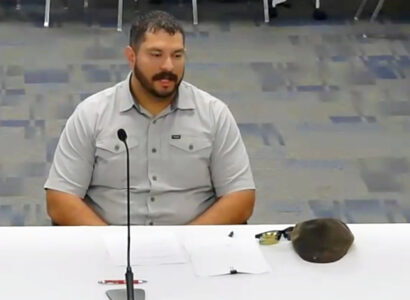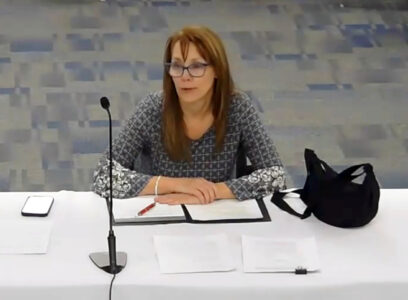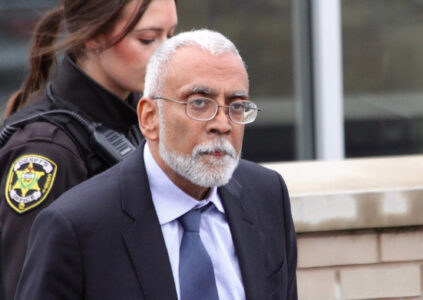KC board interviews candidates
Will select Region III Representative at special meeting next week
- PHOTO PROVIDED Manuel Rodriguez, who is being considered by the school board to fill the recently vacated Region III seat, is seen during his interview this week.
- PHOTO PROVIDED Kimberly Johnson, who is being considered by the school board to fill the recently vacated Region III seat, is seen during her interview this week.
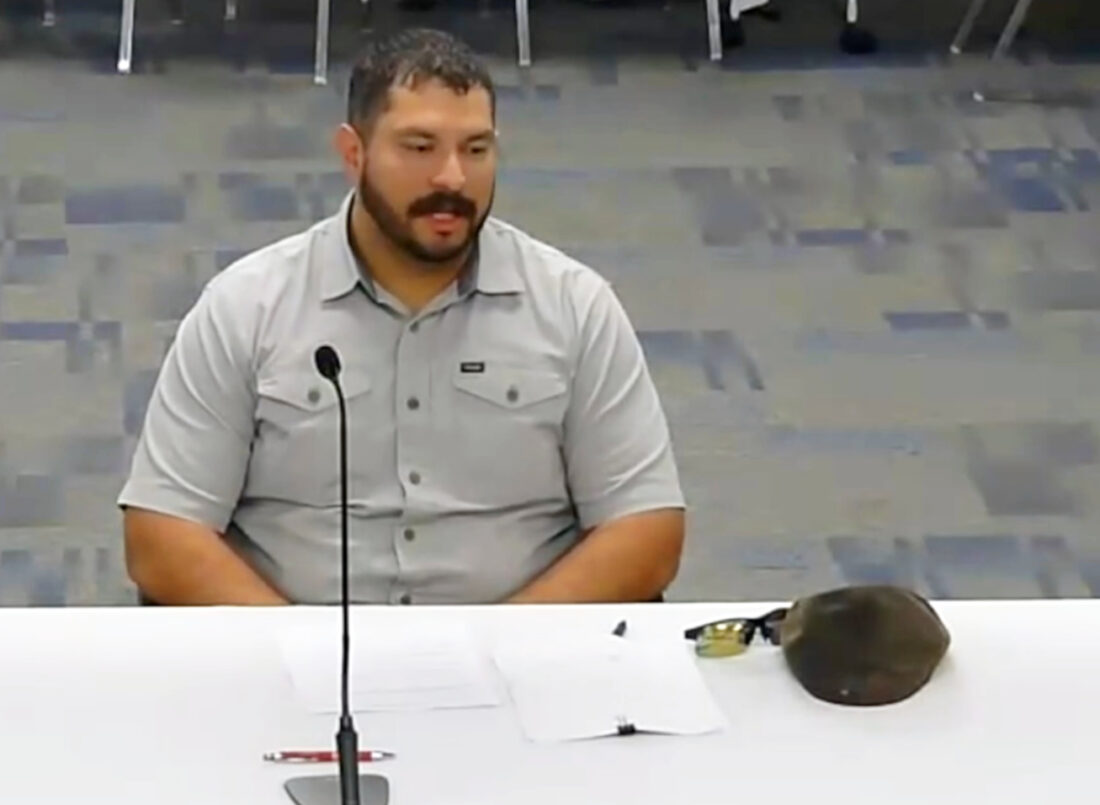
PHOTO PROVIDED Manuel Rodriguez, who is being considered by the school board to fill the recently vacated Region III seat, is seen during his interview this week.
MILL HALL — During a special meeting this week, the Keystone Central School District Board of Directors interviewed two candidates for the recently-opened board seat in Region III.
Region III, which encompasses Beech Creek Borough, Beech Creek, Curtin and Liberty townships, was held by Polly Donahay until the board accepted her resignation on Oct. 10.
During the special meeting, held Tuesday night, the board interviewed Manuel Rodriguez and Kimberly Johnson, the two individuals who responded to the board’s request for letters of interest.
Each candidate answered the following questions:
Q1: Can you tell us about yourself, including what led up to you applying for this vacancy and describe the experience and skills you feel will help you serve effectively at the school district?
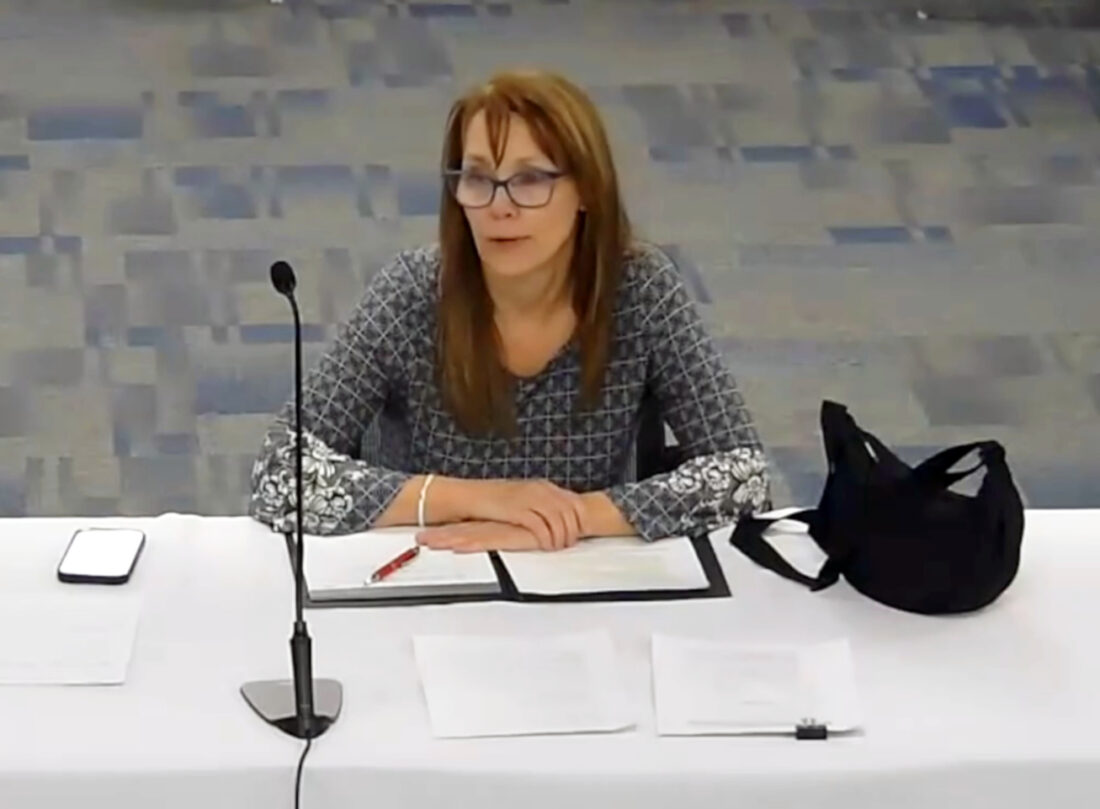
PHOTO PROVIDED Kimberly Johnson, who is being considered by the school board to fill the recently vacated Region III seat, is seen during her interview this week.
Rodriguez: He told the board he is from New York, having grown up in Long Island most of his life. He currently works at the Quehanna Boot Camp in Clearfield and lives in the Blanchard area. He noted he does not intend on leaving the area, even with the camp’s impending closure following direction from the state. He is a father of two children that attend school in the district.
“What led me to apply was, honestly, when my children started attending public school,” he said. “Then I started getting interested in what’s going on, decisions that are being made.”
“As not only a tax payer but a parent to these kids, I wanted to know what’s going on behind the scenes,” he said. “(To) kind of help out and see if there’s any changes to be made, what’s the best position to do it and to step up and help, not just sit back and complain and gripe.”
Rodriguez said he feels he has good communications skills — having served for a time in the boot camp’s hostage negotiation team — and that he works well with people of all backgrounds and with differing ideas.
“I’ve learned to work with that. Even if it doesn’t go my way, I’ve learned to understand it and just continue on,” he said.
Johnson: Johnson said she’s lived in Beech Creek for 20 years and has worked at Lock Haven University for 24 years. In that time she’s worked on various committees, an advisor for various student groups and acquired grants and funding for programs. With her youngest child now in college, Johnson told the board she felt now was the best time to continue giving back, particularly with education.
“I just felt I’m in the season of life where I’m responsible to serve,” she said. “I feel the skillsets (I have) are transferable.”
Q2: What do you see as the greatest strength of the Keystone Central School District and what challenges do we face?
Rodriguez: He told the board one of the district’s greatest strengths is the mixture of various belief systems, backgrounds and cultures that exist within it.
“You can use that to your advantage, because you can never really be one way or another too much or you could break,” he said.
As far as challenges, Rodriguez said the pressure that can be felt as a board member. “That might build up on some of the decisions you make and even facing your peers in public who you didn’t make happy. This is a spot where you aren’t going to make everyone happy,” he said.
Johnson: She touched on the district’s sports program, noting both her children took part in a variety of sports. She commended the coaches and assistance coaches for their work.
Board Member Tom Cannon later asked Johnson’s thoughts on the Career and Technical Education program and trades.
“I am a big supporter of the trades,” she said. “I don’t believe that everybody is meant to go to college but we still want really smart people in those trades. We need mechanics, we need plumbers, we need masons. We’re a growing economy.”
In terms of the district’s weaknesses, Johnson noted — similar to the university — it faces financial difficulties.
“It seems like every school and university there are financial issues and we’re dealing with that at Lock Haven and finding ways to be most effective in spending that money. A challenge would be that there’s probably financial issues and decisions that would be difficult to make,” she said. “I would need to learn more about that. But I’ve been in that position many times, so I think I am a good steward for funding that I could bring to the table.”
Q3: Describe a time when you had to make a difficult decision as part of a group? How did you handle the difference of opinions?
Rodriguez: He described a situation he encountered while serving in Company 2 of Long Island’s fire department, where they were put on a call with a limited number of men. He said there was one gentleman, who he didn’t always see eye to eye with, who made a call he didn’t agree with.
“Later on the captain that was there also kind of agreed with what I said. But at the same time, the guy that was there was the lead person and I had to follow what he wanted me to do because he was calling the shots,” he said.
Johnson: She emphasized listening to people.
“If you don’t listen to people it’s going to come out somewhere else,” she said. “I think compromise is a really good way to go.”
While working in various groups and programs at the university, she said she tries to “be transparent, be civil and try to understand where the person is coming from” when she is met with conflicting views.
“Ultimately you might come up with a decision you’re not happy with, but you’ve done it in a Democratic way and then that’s the way to move forward,” she said.
Q4: What do you believe is the role of a school board member? How does that role differ from the superintendent and the administration?
Rodriguez: He told the board he feels members are meant to “help make decisions that are going to help these children’s future” and emphasized how they have to consider the impact on not only the tax payer who shoulders a financial burden, but the students as well.
Rodriguez admitted the structure of the board and the district were new to him, but said he believed the superintendent and administrator oversee much of the general decision making.
Johnson: She said her understanding is the board sets policy and provides a vision in which the district operates that is in the public interest.
“I think the superintendent, they’re more responsible for day-to-day operations, staffing, dealing with behavioral issues,” she said. “In short, I believe the board is to provide oversight and direction. One is focusing on vision and policy and the other is implementing policy.”
Q5: Collaborative decision making is more effective when members actively listen to all sides of an issue and publicly deliberate before a decision is made. To reach an agreement viewpoints may not be in alignment with your beliefs. Provide an example of a situation in which you did not agree with an opposing group’s view points. How did you respond? After the decision was made and you still didn’t agree with the outcome, what follow up actions did you take? What did you learn?
Rodriguez: He spoke about an instance where the union he was part of was involved in a discussion at the boot camp. He explained there were two opposing views and his side didn’t favor what he and his group were interested in.
“In reality, the thing I could have done there is continue coming to meetings and voicing my opinions as to what we wanted and what we wanted done,” he said. “It’s always a lesson to be learned when it comes down to making a decision and having so many different options and views on things and how some of these people can really, I guess, be strong in their view point.”
Rodriguez stressed that people don’t necessarily have to dig in for every issue they believe in.
“You don’t always have to die on a certain hill. There’s always a battle to be won but maybe not the war,” he said.
Johnson: She told the board there have been many instances where she was faced with an opposing viewpoint and, at times, that viewpoint won out.
“You have to learn to work with other people and understand where they’re coming from,” she said. “If someone has an opposing view I try to start out with what we have in common. Then we can make progress.”
Q6: How will you engage with the community, ensuring voices are heard? And how would you handle a complaint?
Rodriguez: He said, with being involved at the fire department in Blanchard, through work at his church and his newer involvement with Pregnancy Resource Clinic in Lock Haven, he interacts with a lot of people. He noted his wife knows many folks within Region III, too.
“I do engage with a lot of people there. Honestly, I don’t mind sitting down and having coffee with someone. I don’t mind going out for a walk with someone if I see someone and they have a question,” he said. “They can voice their opinions to me really at any point because I’m working for them. I’m here for them.”
In terms of a complaint, Rodriguez said he’d likely make a note of it, or any questions posed to him, that he could bring to the board.
He also presented the board with a list of roughly 88 signatures he was able to get from members of his community, which were reviewed briefly by Board Member Elisabeth Lynch.
“I know it wasn’t required, but I do have a few pages of signatures I got from my neighbors and the community and all of Region III,” he said.
Johnson: She emphasized the importance of communicating with constituents. “I do enjoy meeting with people, being around people and learning about them,” she said.
In terms of a complaint, she said she’d model her approach after the university’s method. Where you start from the bottom — speaking with a professor — and working your way towards the provost to see if a solution can be found.
“That’s how we operate the university and I think that’s how I’d operate if I were on the school board,” she said.
Q7: Explain how you believe the school board can balance responsibilities with providing quality education with the need to have financial stability?
Rodriguez: He told the board to balance the financial aspect with education would mean trying to find a happy medium.
“Trying to find a happy medium between giving quality versus just quantity to these children without breaking the bank,” he said. “There is a big burden in doing that. I’m sure it’s extremely difficult.”
Johnson: She explained her experience with this situation through her role at the university.
“I’m in that situation now where we don’t necessarily have the funding we want. So we have to find creative ways to meet the students’ needs,” she said.
One of the largest goals, she said, would be to ensure a quality education while balancing a budget.
“It is a balancing act but it also involves creativity and being able to think differently. I think if something works, just leave it be. But sometimes we have to come up with new ideas,” she said.
Q8: Do you have relatives that work in the Keystone Central School District?
Both candidates said they do not.
In closing, the candidates were both offered the opportunity to provide a final statement or ask any questions.
Rodriguez said, if chosen, he would work hard to represent his constituents.
“I feel like if you give me a chance to be on the board I’m definitely going to try my hardest to do what I have to do for the people. That’s what I’m here for. For the people,” he said.
Through his work in corrections, he said he’s learned of three important factors to consider in day to day life: Being fair, firm and consistent.
“I feel like those are things that can be applied to just about anything you do. Being fair with people, being consistent so that you don’t surprise people with something new and being firm when you have to,” he said.
He noted he is also bilingual, and touched on how the Hispanic community has grown in the area. He said he felt he could bridge a gap between cultures as well.
“Maybe getting more people involved, coming to school board meetings,” he said. “I do believe that’s something that could help.”
Ultimately, he said he wants to help further education by being a support system for those who need it. He specifically offered Brad McCloskey kudos, noting his kid “lights up” when he sees him.
“It’s things like that that need to be praised in this field with these kids,” he said. “These kids are the future, their education is the future. That’s what counts. That’s what we’re all fighting for.”
Johnson said she felt her more than 20 years of experience in education, working with students, faculty and administration made her a good choice for the position.
“I bring experience in leadership, in policy, in collaboration. I’ve been on many committees and I understand how they work. I have a real commitment to listening and serving the community,” she said. “Lastly, I care deeply about the success of our local schools and I would be honored to contribute that experience and perspective.”
Following the interviews, the board elected to individually review notes taken during the interviews and deliberate during a special meeting on Thursday, Nov. 6.
The meeting will be at 6:30 p.m. prior to the board’s work session, where its members intend to vote and select a candidate to fill the position.

